Zeinab Masri| Jana al-Issa
The first batch of Covid-19 vaccines arrived in Syria, which are part of the allocations the World Health Organization (WHO) pledged to offer Syria under its initiative to support poorer countries in their struggle against the pandemic.
While the Autonomous Administration, controlling northeastern Syria, has so far received no shots, the opposition, controlling northwestern Syria, received its first COVAX-facilitated batch of vaccines and the Syrian regime received the largest share of jabs, provided by the WHO or “friend” countries.
As relevant medical bodies in northern Syria started vaccination campaigns, the Syrian regime-run entities only established an online platform for similar purposes, without clear evidence as to whether recipients have received any shots or not.
The start of vaccination in some areas, ambiguous procedures in others, and the non-delivery in northeastern Syria raised a variety of questions regarding the vaccine administration plans, guarantees to target groups’ access to vaccines, and the extent of administration transparency displayed by de facto authorities.
In this extensive article, Enab Baladi demonstrates to readers the preparations for the COVID-19 vaccine administration across Syria, amidst logistic and geographical challenges to the process given the various authorities in charge of Syrian territories and almost non-existent overseeing entities.
First-phase of vaccination started
Health workers immunized in northwestern Syria
In Idlib city, northwestern Syria, a “preliminary” vaccination drive targeted 12 health and aid workers.
Following this initial procedure, the Syrian Immunization Group (SYG), affiliated with the Idlib Health Directorate (IHD), organized on 29 April a special conference with the participation of civil entities, journalists and media activists. The team announced the date of the vaccination campaign in northern Syria as on 1 May.
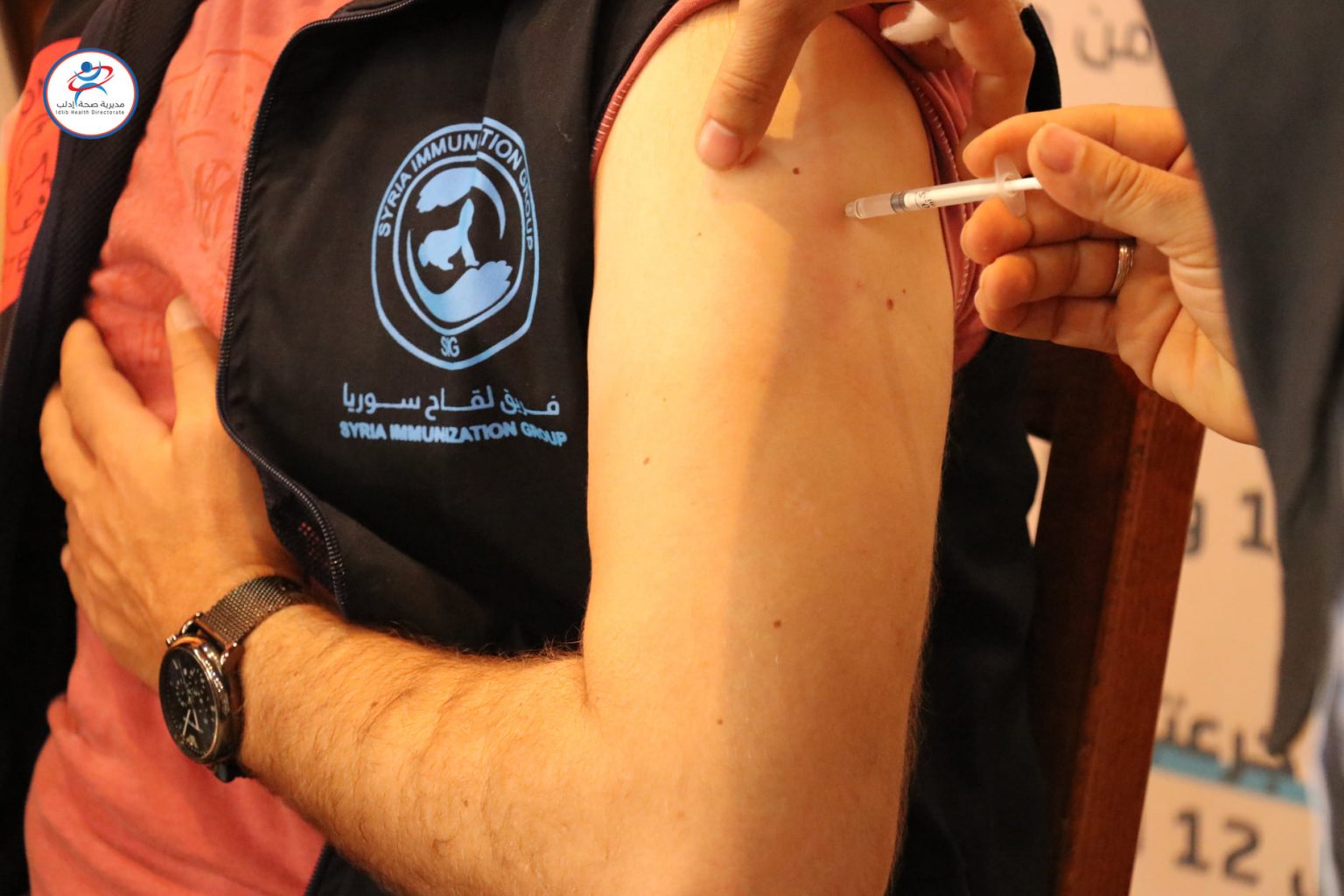
COVID-19 vaccine shots administrated to a group of workers of the Idlib Health Directorate, Assistance Coordination Unit (Syrian Immunization Group) and the Syrian Civil Defense – 1 May 2021 (Idlib Health Directorate-Facebook)
Idlib and Aleppo countryside, both will get vaccines
Vaccination campaigns will cover the entire region north of Syria, stretching from Idlib to the countryside of Aleppo, doctor Marwan Qadour, SIG central room member, told Enab Baladi. This means that the vaccines the WHO sent to northern Syria will be shared between the areas under the control of the Syrian Salvation Government (SSG) and those run by the Syrian Interim Government (SIG).
Qadour said that vaccines will be administrated through 93 immunization points set up in hospitals and health centers in the northwestern region. Jabs will be provided to targeted groups regardless of their place of residence.
He added that a “preliminary” immunization process began on 26 April. Jabs were administrated to 12 members of the SIG, IHD and the Civil Defense, without any complications. The side effects that some recipients displayed were limited to mild fever.
He pointed that the SIG is working “closely” with the WHO and the United Nations Children’s Fund (UNICEF), and is operating under both agencies’ supervision.
The first batch, consisting of 53,800 doses the WHO sent under the COVAX agreements, arrived through the Bab al-Hawa border crossing with Turkey to northwestern Syria on 21 April.
In a 30 March statement to Enab Baladi, the WHO representative to Syria, Akjamal Majtimova, said that the agency will also provide immunization centers with the necessary equipment for storing vaccines and prepare the centers against overcrowding in order to prevent further virus transmission.
Furthermore, the WHO will dedicate 123 specialized vaccination teams assigned to the various centers across northwestern Syria, in line with lessons learned from previous COVID-19 prevention and response measures.
Doctor Qadour said that the first phase of immunization will target health personnel and aid workers, while the second phase will concentrate on the elderly, people with chronic diseases, and workers in public affairs who maintain a high level of contact with the population.
The Syrian COVID-19 administration plan
Supervised by the WHO
Imad Zahran, IHD spokesperson, told Enab Baladi that the SIG and the IHD have been administrating vaccines in the region for over seven years. Accordingly, they own extensive experience in this field.
Addressing recipients’ concern over the UK-developed AstraZeneca’s side effects, such as blood clots and its age-specific recommendations, Zahran said that the vaccine is authorized by the WHO and was re-used after being “precautionary” suspended in some countries. He added that the immunization campaign in Idlib will be carried out “in the most favorable way” since there are no obstacles.
In January, the European Medicines Agency (EMA) granted AstraZeneca authorization across the European Union (EU), while an official of the WHO reported that the AstraZeneca COVID-19 vaccine is still “largely positive” and outweighs the risk of rare but serious blood clots.
IHD gearing up immunization teams
As the scheduled immunization campaign in northwestern Syria approached the launch date, the IHD and the SIG held a training program for health personnel that will carry out immunization, designed and approved by the WHO and UNICEF.
According to an IHD update, posted on Facebook on 25 April, the first training sessions targeted the governorate and district supervisors, as well as immunization team supervisors. Trainers introduced attendees to the vaccine, its components, how to arrange the vaccination sessions, and follow-up on jab recipients to monitor and address side effects, as well as how to document the immunization operations.
The trainees were also provided with information about the knowledge and skills required to manage and implement immunization safely and effectively.
The second training session targeted logistics teams who were introduced to international standards for warehousing, transporting and distributing the vaccine using sound scientific methods, to ensure the vaccines will remain safe and effective.
The third training session targeted the immunization team members. This group was also introduced to the vaccine, its components, the manner to arrange for an immunization session and follow-up on jab recipients. Trainees were also informed of the skills required to administrate the vaccine safely and effectively.
Northwestern Syria is witnessing an alarming spike in COVID-19 positive cases, amid warnings and calls from health authorities and organizations for the population to adhere to preventive measures to control the spread of the pandemic.
On 5 April, the Syria Response Coordination Group (SRCG) warned against the increase in infections, expecting a new rise in cases as a result of the population’s negligence of preventive measures and extremely modest humanitarian responses in the region, calling on locals to cooperate with health authorities to ease the burden on the already stretched health care sector.
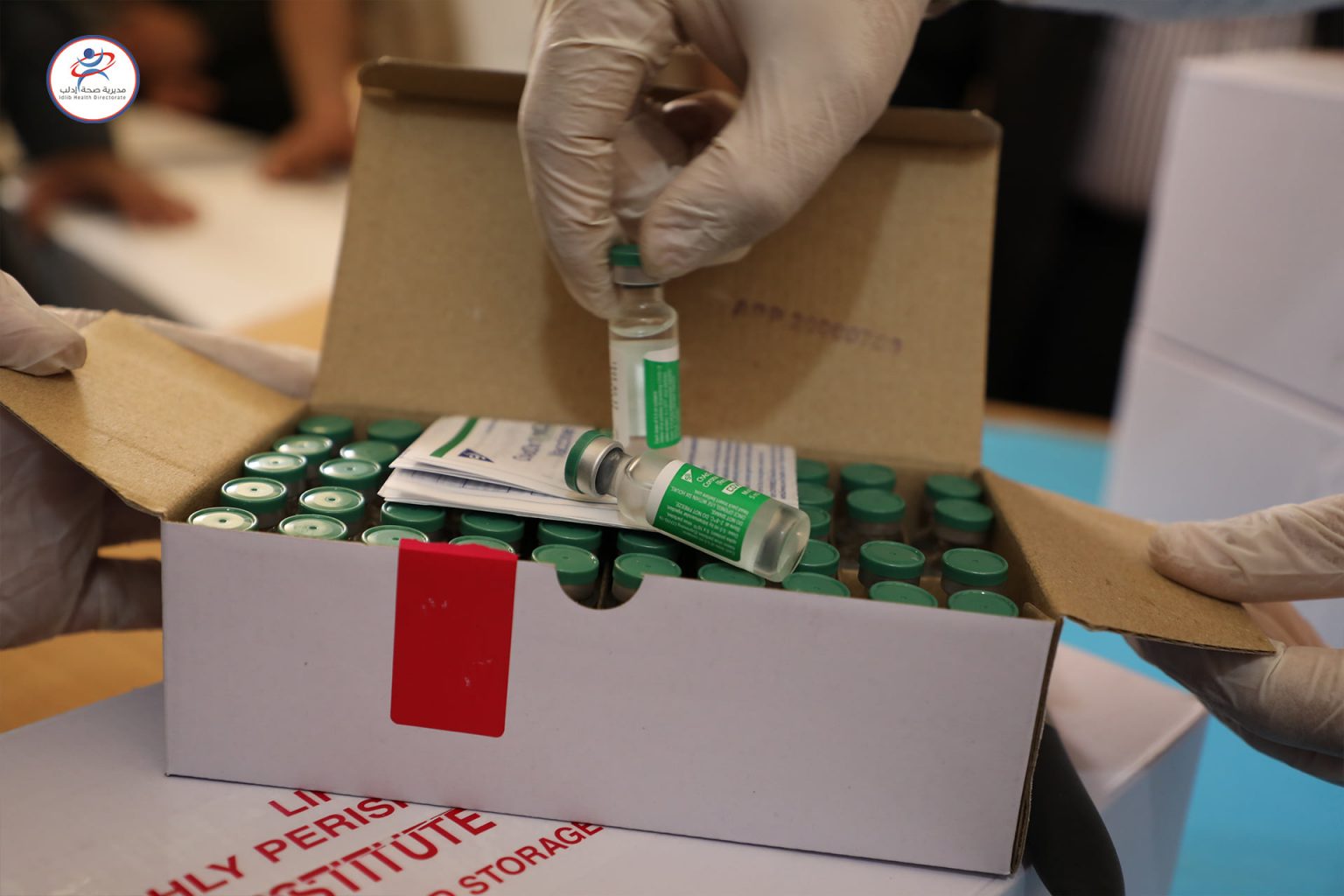
COVID-19 vaccine shots administrated to a group of workers of the Idlib Health Directorate, Assistance Coordination Unit (Syrian Immunization Group) and the Syrian Civil Defense – 1 May 2021 (Idlib Health Directorate-Facebook)
Several types of the vaccine
Regime goes low-key about immunization campaigns
Even though regime-held areas were delivered vaccine batches of different quantities and types, sent by “friend” countries, in addition to the first WHO-allocated shares, the statements of regime officials were short on details about vaccines, the dates and mechanism of administration, or the target groups to receive the jabs.
While no statements were made by regime health officials, the Emirates News Agency (WAM) reported that two planes landed in Damascus on 20 and 27 April, carrying a “large” quantity of vaccine doses, without disclosing the type or the exact number of jabs. The vaccines were sent with additional amounts of medicines and medical supplies.
On 29 January, the Lebanese newspaper al-Akhbar, close to Hezbollah, said that a private Emirati plane arrived at Beirut-Rafic Hariri International Airport a few days ago, with COVID-19 vaccine doses for 5,000 persons. The cargo was shipped directly from Beirut to the Syrian capital, Damascus.
On 22 April, the regime’s Ministry of Health announced that it had received the first batch of WHO-supplied AstraZeneca vaccine in accordance with the COVAX agreement. The batch consisted of 302,000 doses of AstraZeneca-Serum Institute of India (AZSII).
Two days later, the health ministry received 150,000 doses of the China-developed Sinopharm vaccine on board a Syrian carrier. In a February statement, the Chinese ambassador in Damascus announced his government’s decision to present these doses to the regime’s government in “aid”.
Upon receiving vaccine doses, the health minister, Hassan al-Ghobash, said that the first groups to be immunized are “medical personnel, as in all countries worldwide,” hoping that other batches would arrive as to immunize the elderly and those with chronic diseases.
The regime was similarly reserved about the Chinese vaccine it received earlier this year and the immunization process as well. Regime officials did not disclose any information about the vaccine doses, including quantity, type, neither the administration plan nor the authorities supervising the process.
Regime officials only stated that the health ministry will first administrate the vaccine to health workers on frontlines across regime-held governorates. Immunization was scheduled for the first week of last March.
On 17 March, Reuters reported that a small batch of 5000 doses of the Chinese Sinopharm vaccine was the first to be delivered to the Syrian regime, unmediated by the COVAX platform, but rather as donations from China to frontline health workers.
After the Syrian regime was delivered the COVAX-donated allocations of the vaccine dozes, official statements were limited to the member of the advisory team to face the COVID-19 pandemic, Nabug al-Awa. He only said that batches of Russian and Chinese vaccines, as well as AstraZeneca, have arrived in regime-controlled areas.
Talking to Sham FM Radio, on 24 April, al-Awa said the health ministry decided to administrate the Russian and Chinese developed vaccines to doctors and people under 50, and to give AstraZeneca vaccine to people over 50 years old, especially those with chronic diseases, to avoid any surprises.
Even though Russian vaccines are on the administration plans, neither Russian nor regime officials, announced the arrival of Russia-developed vaccines. The last official information provided about Russian vaccines was provided by the Syrian ambassador to Russia, Riad Haddad, on 11 April. Haddad said that a new batch of Sputnik-V will arrive in Syria in April.
On 16 February, the Russian special envoy to Syria, Alexander Lavrentiev, expressed Russia’s readiness to provide support to Syria, noting that Russia “hopes to be able to supply Syria with the vaccine as soon as it is registered in Syria.”
On 22 February, the Syrian embassy in Moscow said, “the Syrian Arab Republic has fulfilled all the procedures for registering the Russian Sputnik V vaccine against the coronavirus infection and permitted its use on its territory.”
Health workers concerned over lack of transparency
The lack of official statements about the details of immunization plans, and the other conflicting statements by health ministry officials on the numbers of COVID-19 positive cases have inspired doubts among health workers.
The regime’s health minister’s al-Ghobash statements, after Damascus received three types of COVID-19 vaccines, was an announcement of an online platform, set but not activated yet, with the aim of “providing citizens wishing to receive the vaccine with the chance to register, as to establish an integrated database that will facilitate the vaccine administration process.”
On the condition of her anonymity, a nurse working at the Al-Assad University Hospital in Damascus told Enab Baladi that she lost trust in the statements of health officials years ago. She added that her mistrust grew even greater as the COVID-19 pandemic hit Syria.
She added that owing to the nature of her work, she had access to details of all happenings within hospital departments. She emphasized that the available “simple” medical services provided to patients in the hospital do not match the allegations of regime officials, who claimed they had the ability to fully control the pandemic.
She said that first-hand experiences she had at the hospital over the course of the pandemic prompted her to decide not to take any health ministry-administrated vaccines. “I have completely lost trust, even in the type of the vaccine I will receive.”
The nurse prefers to be hit by the virus because “it is still safer for me than receiving a vaccine that may be hand filled under the ministry’s order.”
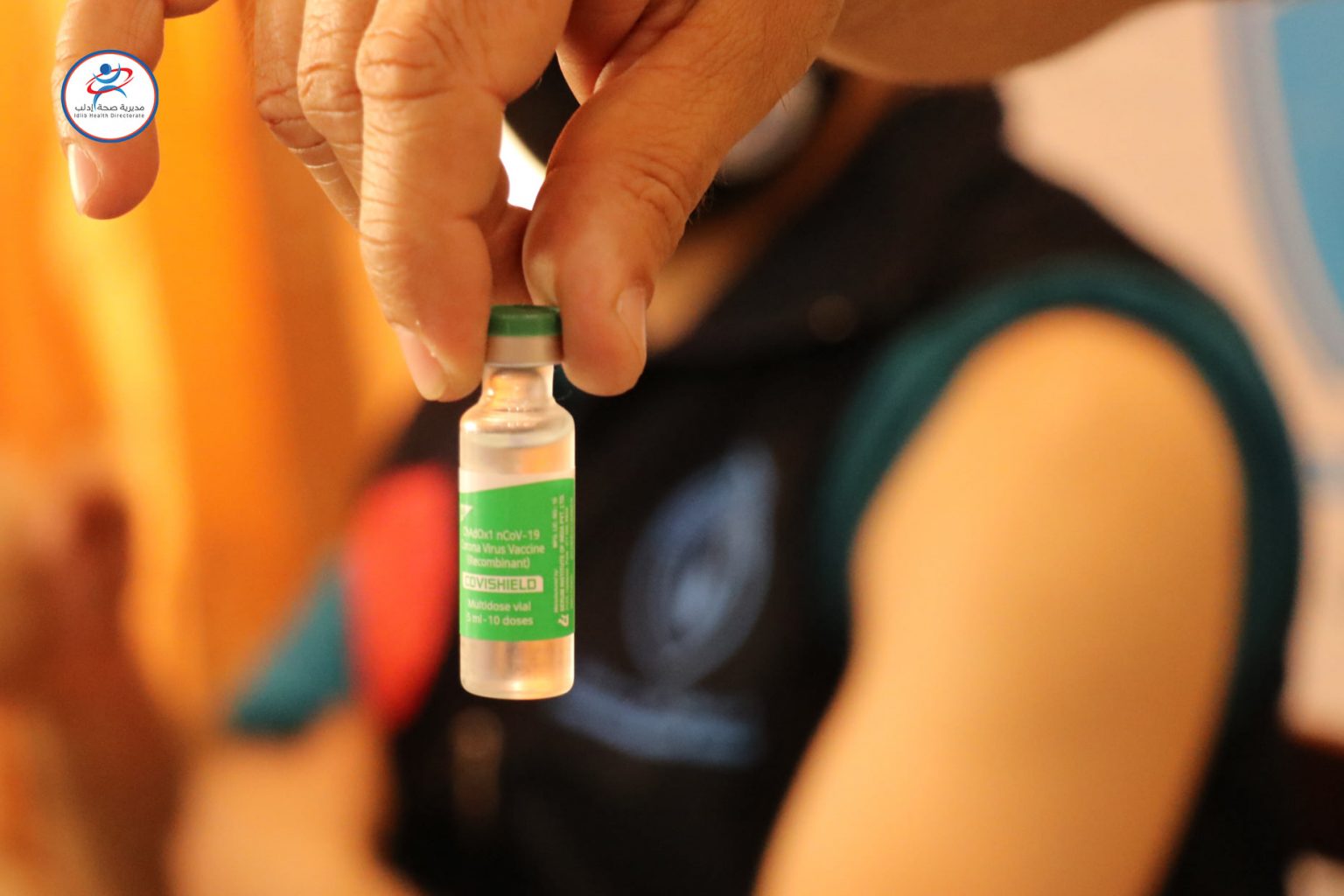
COVID-19 vaccine shots administrated to a group of workers of the Idlib Health Directorate, Assistance Coordination Unit (Syrian Immunization Group) and the Syrian Civil Defense – 1 May 2021 (Idlib Health Directorate-Facebook)
Relations govern administration
Wishing that his surname be withheld, Germany-based Rabei told Enab Baladi that it was not surprising that there were no clear statements about the regime-led immunization plans.
Before he arrived in Germany, Rabei worked in the Damascus Health Directorate of the Ministry of Health for many years. He said, relying on his experience with the ministry’s procedural approaches in such circumstances, that the reason for the regime’s media ambiguity about vaccines arises from several reasons, most notably corruption.
He added that the health ministry is the first entity to receive the vaccine. The ministry then distributes doses to health directorates in the governorates, including health centers that will be provided with special immunization equipment.
Given “favoritism and preferential treatment,” the ministry is unlikely to distribute the full quantity of vaccines to directorates. Rabie added that the “ministry” will keep a share aside for “state or non-state heavy weighted acquaintances,” and also key officials.
In the 2020 report, Transparency International concluded that Syria ranked 14 on a 180-state-list.
For the fourth year in a row, Syria ranked next to last in the organization’s annual report on corruption perceptions index, which monitors the state of transparency and corruption in 180 countries around the world.
For the purposes of the 2020-report, corruption experts focused on corruption in the health care sector. The managing director of Transparency International, Daniel Erickson, said that the pandemic represented an appropriate opportunity for corrupt governments. He noted that there is a relationship between the levels of corruption and response to pandemic-driven health crises.
He added that the purchase of medical devices and masks, in particular, is not carried out in a transparent manner by authoritarian governments.
This makes such purchases attractive. Through them, one can divert money in order to enrich himself at the expense of others, and thus fewer investments are made into the health system in poor countries.
Regular visits to ensure “transparency”
The WHO representative in Syria, Akjamal Majtimova, told Enab Baladi that the vaccines that have been delivered to the Syrian regime “have not yet been shipped or distributed to any of the governorates but the shipments are being prepared with distribution commensurate to target groups.”
She added that “according to the National Deployment and Vaccination Plan, the COVID-19 vaccination will use a similar approach to the routine immunization programme, reaching all locations regardless of areas of control.”
“This approach has been practically used for all previous routine immunization activities. To ensure more transparency in the COVID-19 vaccine roll-out, WHO and UNICEF will conduct regular visits to vaccination sites engaging the third-party focal points,” she added.
Limited testing, impossible assessment
UNICEF Executive Director Henrietta Fore, in her remarks to the Security Council, said that “the number of reported COVID-19 cases, including among humanitarian workers, continued to rise considerably.”
She added that “limited testing in all parts of the country makes the extent of the outbreak impossible to assess with certainty,” given the fact that “data is not comparable due to differences in the overall context and testing modalities.”
She added that, in March, the regime health ministry, “with the support of WHO and UNICEF, has initiated a COVAX related training of trainers, followed by cascaded training for field staff at governorate level on microplanning, service delivery, communication, infection, prevention and control, as well as adverse events following immunization, and cold chain management.”
Health sector officials had made mismatching statements regarding the number of COVID-19 cases in regime-held areas.
The General Director of the Mouwasat University Hospital, in Damascus, Issam al-Amin, said that the pandemic’s curve flattened, and the number of suspected COVID-19 cases decreased last April.
However, the Director of Ambulance and Emergency Department, Tawfiq Hassaba, said that the word dangerous is insufficient to describe the status of the pandemic’s spread and the curve has been flattened throughout the country, but while having an upwards trajectory.
Coming from Damascus
Northeastern Syria waiting for its share of AstraZeneca
Although health authorities in northwestern Syria and the government of the Syrian regime received the first batch of the British WHO-allocated vaccine, the Autonomous Administration of northeastern Syria still has to wait for its shares of the vaccine.
Northeastern Syria was also pledged a certain number of doses, while it is currently witnessing an excessive spread of the virus and a shortage of medical supplies.
On the condition of his anonymity for security reasons, a doctor working with the Autonomous Administration told Enab Baladi that the administration expects its share of the vaccine to arrive next week.
The doctor added that the Administration also expects to receive only 20,000 to 30,000 doses of the AstraZeneca vaccine, which is a “very small and unfair” amount for the 25 percent of the Syrian population who reside in areas controlled by the Administration.
Looming health disaster
The regions of northeastern Syria are witnessing an increase in the number of COVID-19 cases. In response, local authorities imposed a curfew, prevented public gatherings and ended the school year early, calling on the population to adhere to preventive measures, social distancing and wearing a mask.
Officials of the Administration’s Health Committee warned of an impending humanitarian disaster that will plunge the region into a difficult situation as a result of the outbreak because deaths and positive cases are constantly spiking.
The co-chair of the committee, Joan Mustafa, accused the WHO of being indifferent, as it took no steps so far to provide the region with vaccines or any form of assistance.
In a 27 April report, the International Rescue Committee (IRC) warned that “a severe shortage of testing supplies and oxygen in northeast Syria is putting the region’s COVID-19 response in serious jeopardy.”
Misty Buswell, Policy and Advocacy Director for the IRC in the Middle East and North Africa, said that “Testing capacity in the northeast has never been sufficient, and now it may be lost altogether.”
The report added that “the COVID lab in Qamishli – which is the only COVID-19 lab run by the Administration – could be forced to stop testing in less than 7 days due to a critical shortage of RNA extraction kits.”
The IRC is “also making an urgent call for funding and support to the response to fill the extensive gaps that still exist. It is also reiterating its call for the UN Security Council to reauthorise the Yarubiyah border crossing with immediate effect so that UN agencies can use all possible means to support the COVID-19 response, which is currently in serious jeopardy.”
WHO, “indifferent”?
On 26 April, Mustafa said that part of the vaccines that arrived last week in Damascus were allocated to the regions of northeastern Syria with a share of 10 percent, amounting to 23,000 thousand doses and the WHO will supervise the delivery and distribution of the vaccine in the region.
He added that the allocated doses are “very little” and are insufficient for a region where five million people live.
Mustafa did not highlight a clear delivery date, stressing that how to deliver vaccines from regime-held areas to Administration-held areas is under discussion.
Regime officials did not disclose any details of the discussions conducted with the Autonomous Administration regarding delivering the latter its share of the vaccines.
For her part, the WHO representative in Syria, Akjamal Majtimova, told Enab Baladi that “Vaccination roll-out in Northeast Syria is part of the National Deployment and Vaccination Plan of Syria.”
Majtimova added that the first batch of vaccines has arrived in Damascus recently and that “vaccine doses will be distributed to all governorates including Northeast Syria as per priority groups targeting health workforce.”
“WHO is currently working with the Ministry of Health and other partners to facilitate the dispatch of vaccines to Northeast Syria,” she added.
Plan changes
Majtimova added that “given the shortage of and increasing demand for vaccines globally, Syria received only 203,000 vaccine doses which is much less than initially committed. The plan for these quantities is to target health workers only, including those based in various parts of Northeast Syria.”
In a March statement, she said that 336,000 doses were planned to be delivered to northwestern and another 90,000 to northeastern Syria, with mobile teams to reach the camps, but the distribution of the vaccine depends on its availability on the global market, manufacturing capacity, procurement and delivery.
The WHO, and partners, advocate providing more vaccine doses to Syria, which will grant more people access to immunization, including populations in northeastern Syria.
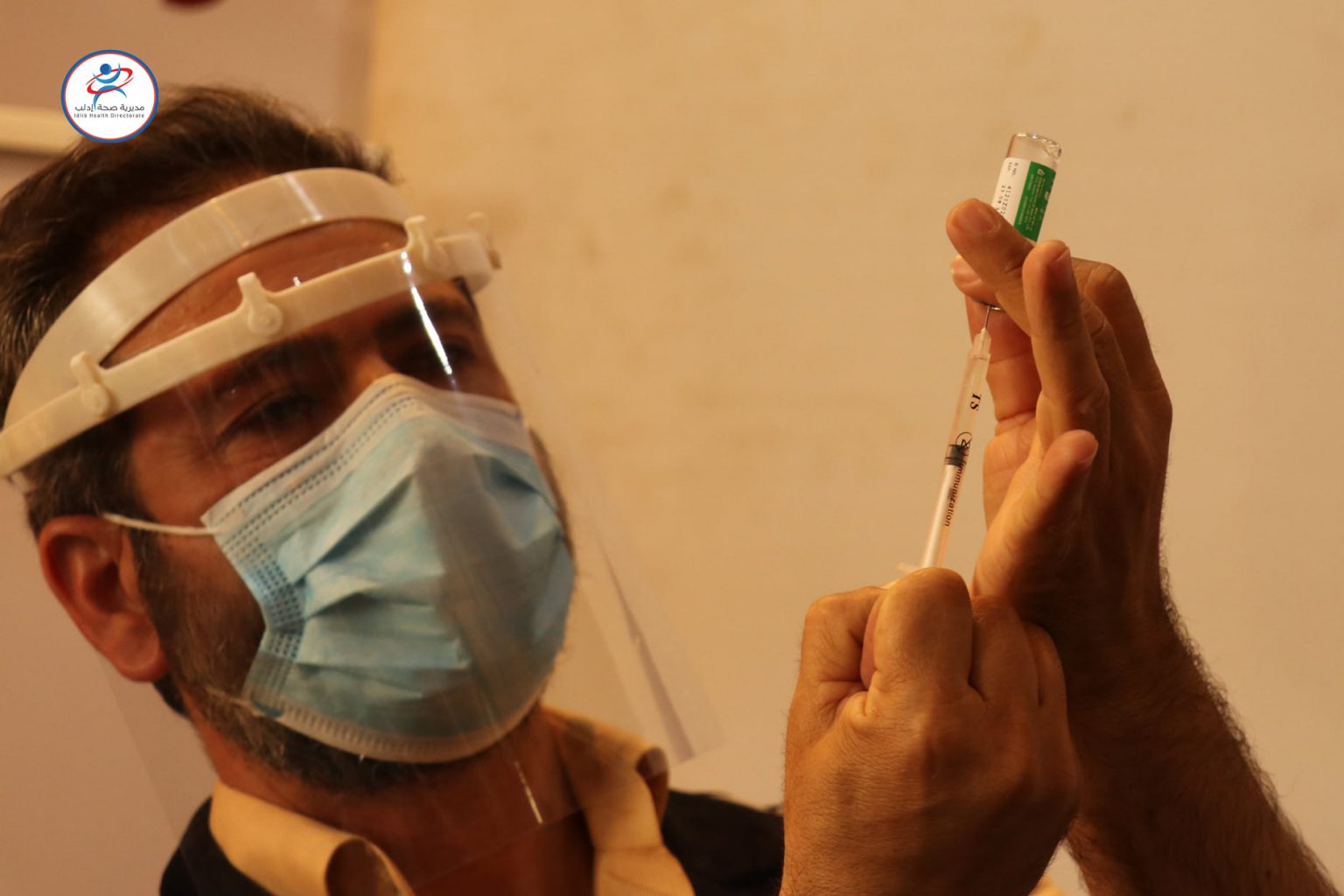
COVID-19 vaccine shots administrated to a group of workers of the Idlib Health Directorate, Assistance Coordination Unit (Syrian Immunization Group) and the Syrian Civil Defense – 1 May 2021 (Idlib Health Directorate-Facebook)
Anas al-Khouli, Enab Baladi correspondent for Idlib city, contributed to this article.
if you think the article contain wrong information or you have additional details Send Correction
النسخة العربية من المقال
-
Follow us :













 Edited by Enab Baladi
Edited by Enab Baladi





 A
A
A
A
A
A






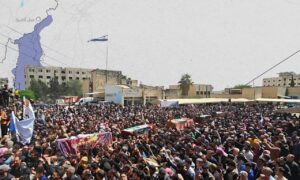



 More In-Depth
More In-Depth